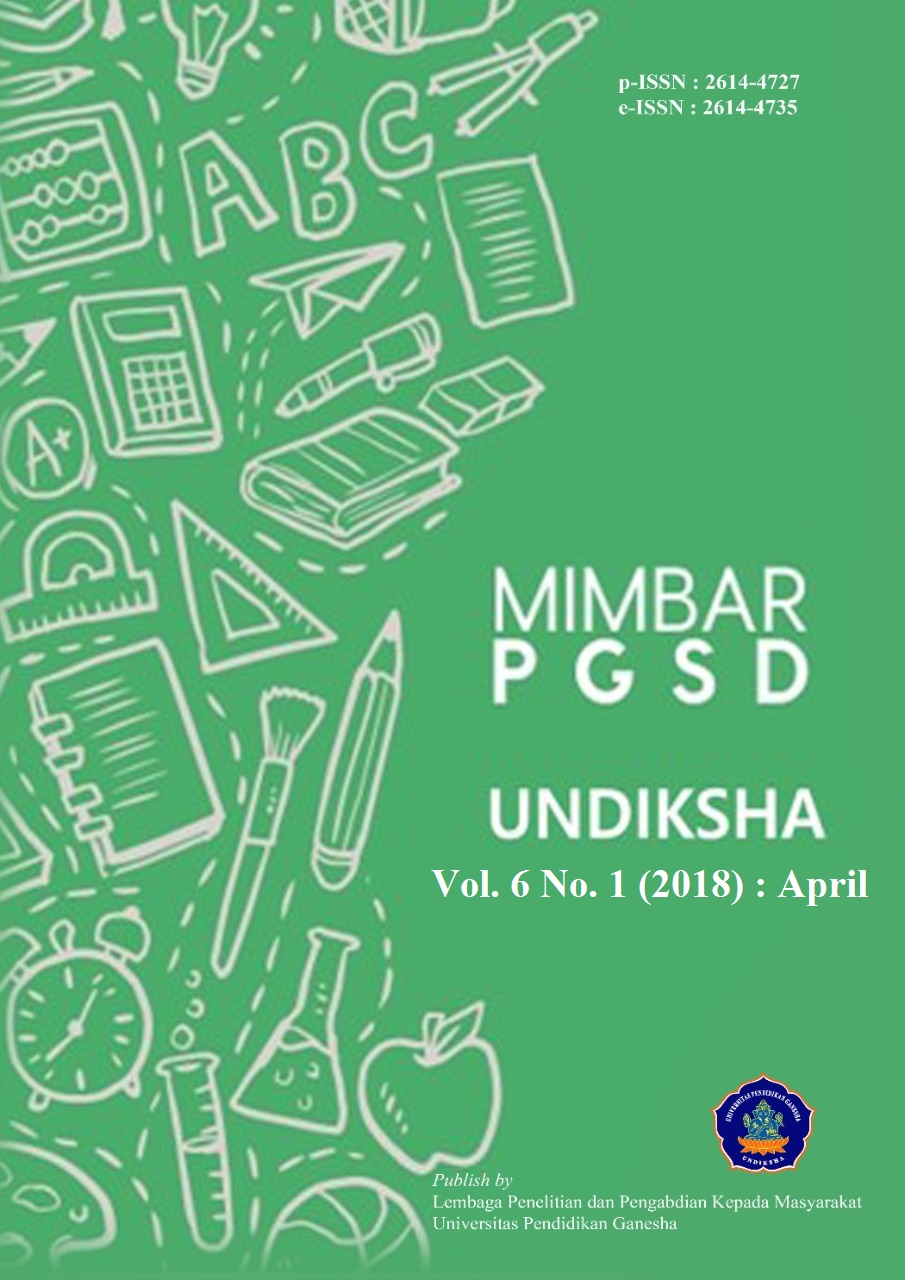PENGARUH MODEL PEMBELAJARAN SAVI BERBASIS MIND MAPPING TERHADAP MOTIVASI BELAJAR IPS DI SD
DOI:
https://doi.org/10.23887/jjpgsd.v6i1.12921Abstract
Penelitian ini bertujuan untuk mengetahui perbedaan motivasi belajar IPS antara siswa yang dibelajarkan menggunakan model pembelajaran SAVI berbasis mind mapping dan pembelajaran tanpa menggunakan model pembelajaran SAVI berbasis mind mapping pada siswa kelas V SD di gugus V Kecamatan Buleleng, Kabupaten Buleleng. Sampel penelitian ini yaitu siswa kelas V SDN 1 Petandakan sebagai kelas ekperimen dan SDN 1 Sari Mekar sebagai kelas kontrol. Pengumpulan data penelitian ini menggunakan instrumen kuisiooner motivasi belajar. Data yang dikumpulkan dianalisis menggunakan analisis statistik deskriptif dan statistik infrensial (uji-t). Hasil penelitian ini menemukan bahwa terdapat perbedaan motivasi belajar IPS yang signifikan antara kelompok yang dibelajarkan menggunakan model pembelajaran SAVI berbasis mind mapping dan siswa yang dibelajarkan tanpa menggunakan model pembelajaran SAVI berbasis mind mapping (thitung=10311>ttabel=2018) artinya thitung lebih besar daripada ttabel yang menunjukkan adanya perbedaan yang signifikan. Perbandingan hasil penghitungan rata-rata nilai motivasi belajar IPS siswa yang mengikuti pembelajaran menggunakan model pembelajaran SAVI Berbasis mind mapping 121,88 sedangkan siswa yang dibelajarkan tanpa menggunakan model pembelajaran SAVI berbasis mind mapping 103,30. Ini berarti bahwa penggunaan model pembelajaran SAVI berbasis mind mapping berpengaruh terhadap motivasi belajar IPS siswa kelas V SD di gugus V Kecamatan Buleleng tahun pelajaran 2016//2017.Kata Kunci : SAVI, mind mapping, motivasi belajar
This study aims to determine the difference in motivation of IPS learning between students who were taught using SAVI based learning model of mind mapping and learning without using SAVI based learning model mind mapping on students of class V SD in Gugus V Buleleng District, Buleleng Regency. The sample of this research is students of class V SDN 1 Petandakan as an experimental class and SDN 1 Sari Mekar as a control class. The data collection of this research using questionnaire instrument of learning motivation. The data collected were analyzed using descriptive statistical and statistical analyzes (t-test). The results of this study found a significant difference in learning motivation between IPS learning groups using SAVI learning model based on mind mapping and students who were taught without using SAVI learning model based on mind mapping (tCount=10311>ttable=2018) that is tcount bigger than ttable Which indicates a significant difference. Comparison of calculation result of mean value of learning motivation of IPS students following learning using SAVI based learning model mind mapping 121,88 while the students who were taught without using SAVI based learning model mind mapping 103.30. This means the use of SAVI-based learning model of mind mapping learning motivation of IPS students in grade V elementary school in gugus V Buleleng sub-district in the academic year 2016/2017.
keyword : SAVI, mind mapping, learning motivation
Published
2018-01-04
How to Cite
., G. H., ., D. I. M. S. M., & ., D. N. W. A. M. (2018). PENGARUH MODEL PEMBELAJARAN SAVI BERBASIS MIND MAPPING TERHADAP MOTIVASI BELAJAR IPS DI SD. MIMBAR PGSD Undiksha, 6(1). https://doi.org/10.23887/jjpgsd.v6i1.12921
Issue
Section
Articles
License
Authors who publish with the Mimbar PGSD Undiksha agree to the following terms:
- Authors retain copyright and grant the journal the right of first publication with the work simultaneously licensed under a Creative Commons Attribution License (CC BY-SA 4.0) that allows others to share the work with an acknowledgment of the work's authorship and initial publication in this journal.
- Authors are able to enter into separate, additional contractual arrangements for the non-exclusive distribution of the journal's published version of the work (e.g., post it to an institutional repository or publish it in a book), with an acknowledgment of its initial publication in this journal.
- Authors are permitted and encouraged to post their work online (e.g., in institutional repositories or on their website) prior to and during the submission process, as it can lead to productive exchanges, as well as earlier and greater citation of published work. (See The Effect of Open Access)













